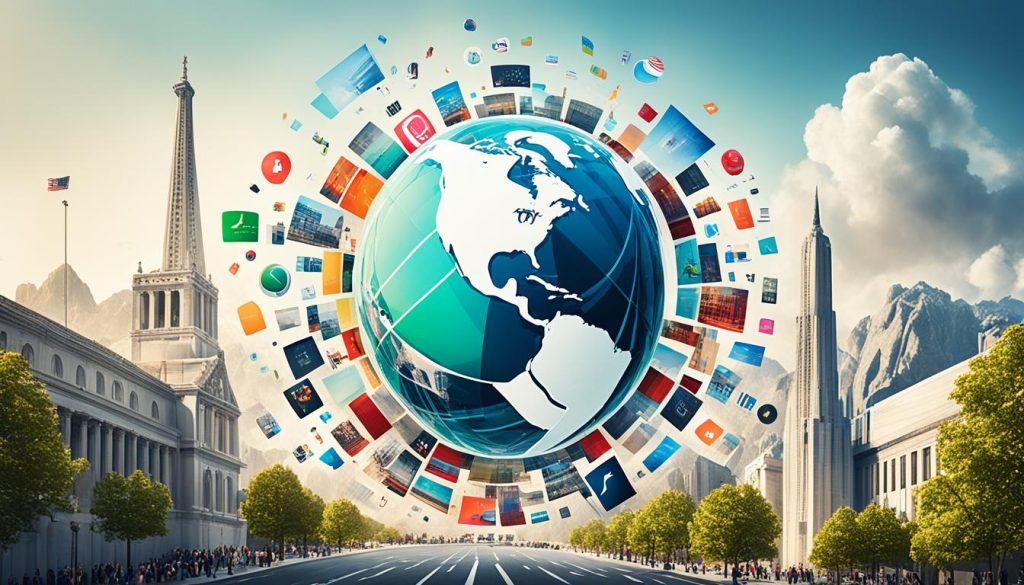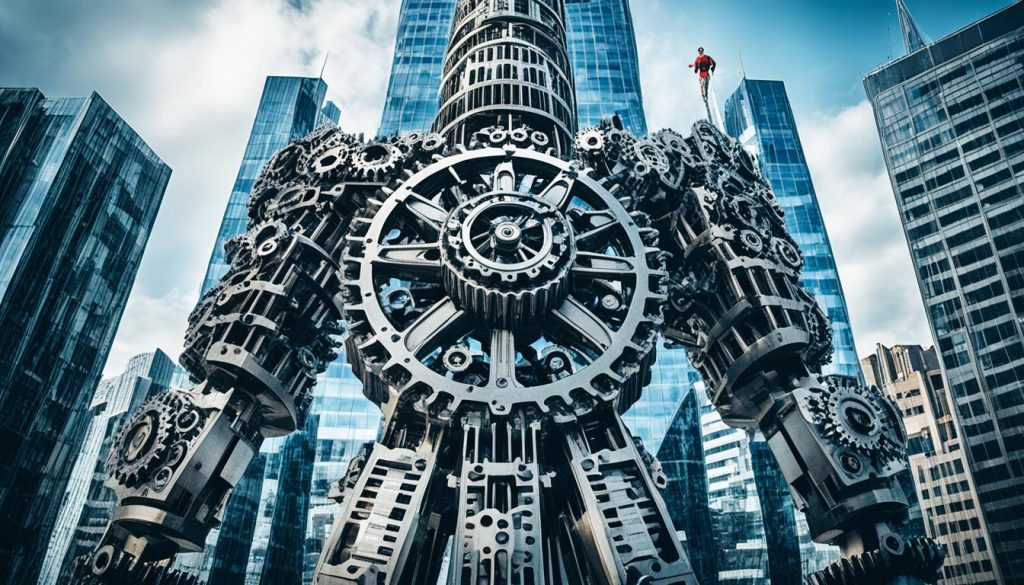In today’s world, huge multinational companies are very important. They help international trade to grow. These big companies have a big impact on economies all over the world. They are a sign of success in business. As giants in international business, they top the lists of the Fortune Global 500. They are often at the top of Forbes’ rankings of The World’s Largest Public Companies, too.
Key Takeaways
- Leading multinational corporations drive substantial international commerce.
- These major global enterprises shape global economic landscapes.
- International business behemoths dominate top world rankings such as Fortune Global 500.
- Cross-border operations by these corporations are critical for global trade.
- These entities exemplify corporate success on a massive scale.
Introduction to Multinational Companies
Multinational companies, often called MNCs, operate in many countries but have their main office in one country. They are key players in the world economy, affecting trade and investments everywhere.
Definitions and Characteristics
Multinational companies do business and provide services in several countries. They are known for their diverse market presence, detailed structures, and teams from various cultures. These features help MNCs adjust to different markets. They combine local and global strategies to be more efficient.
Importance in the Global Economy
Multinationals play a vital role in our connected global economy. They create jobs, bring new technologies, and boost trade globally. The World Trade Organization (WTO) says MNCs are a big part of global trade.
They also help economies grow and develop, as mentioned by the United Nations Conference on Trade and Development (UNCTAD). The International Monetary Fund (IMF) agrees, saying MNCs make economies more dynamic and competitive.
| Characteristic | Explanation |
|---|---|
| Diverse International Market Presence | Operating in multiple countries allows MNCs to tap into different consumer markets and invest in new regions. |
| Complex Organisational Structures | These structures facilitate efficient management of operations across various global locales, ensuring streamlined processes and productivity. |
| Cross-Cultural Workforce | A diverse workforce enhances creativity, innovation, and adaptability, essential traits for success in varied market conditions. |
| Technological Innovation | MNCs invest heavily in R&D, driving innovation and advancements that benefit multiple industries and economies. |
| Job Creation | By setting up operations in different countries, MNCs provide employment opportunities on a global scale. |
History of Multinational Corporations
Multinational companies started during the colonial era. The 1600s saw the rise of the East India Companies. These firms began the trend of international business by using global trade routes and setting up in various continents.
Early Beginnings
The Industrial Revolution boosted multinational corporations. This era brought technological progress and increased production. The British East India Company and the Dutch East India Company expanded worldwide, using these advancements. They were key in forming the structure of global business.
Expansion and Globalisation
After World War II, international businesses grew rapidly. This growth was powered by better transportation, communication, and technology. Companies like General Motors and IBM went global, creating subsidiaries and forming international partnerships. Market deregulation also helped firms work across borders, leading to a boom in company growth.
Recent years have seen technology further boost globalisation. Digital communication, the internet, and improved logistics have made it easy for businesses to work internationally. This has increased their global influence.
The story of multinational corporations is a key part of economic history. It highlights human creativity and business savvy. These companies have a massive impact on the global economy. They drive forward progress and innovation like never before.
What are the Largest Multinational Companies
The world’s biggest multinational companies significantly impact the global economy. They are benchmarks for international business, well-known for their high revenue, broad market value, and international operations. The Fortune Global 500 rankings show which of these top conglomerates lead in sectors like technology, energy, and consumer goods.
To understand why these companies are leaders, we look at their financial performance and global presence. Key factors, such as revenue and market value, place Apple Inc., ExxonMobil, and Walmart at the top. Their annual reports and financial details show how they stay ahead worldwide.
Here is a detailed comparison of a few significant companies:
| Company | Revenue (in billions) | Market Value (in billions) | Industry |
|---|---|---|---|
| Walmart | 572.8 | 392.8 | Retail |
| ExxonMobil | 413.7 | 356.6 | Energy |
| Apple Inc. | 365.8 | 2,741.2 | Technology |
| Amazon | 469.8 | 1,571.5 | Consumer Goods |
| Royal Dutch Shell | 261.5 | 223.0 | Energy |
The way these companies are structured varies by their industry and location. Tech companies like Apple and Amazon lead with innovation and market control. On the other hand, energy giants such as ExxonMil and Royal Dutch Shell have huge operational scales and varied portfolios. Companies in consumer goods, like Walmart, rely on vast distribution networks to stay on top globally.
In summary, the largest multinational companies come from dynamic industries. They are world leaders because of their financial success and global operations. These companies stand out by constantly growing, reaching further, and innovating.
Technological Giants in the Corporate World

The world’s top technology firms have changed industries and our daily lives. Companies like Apple, Microsoft, Amazon, Alphabet, and Samsung lead with innovation. Their global influence is unmatched.
Top Tech Multinationals
Apple stands out in Silicon Valley with its iPhones, iPads, and MacBooks. These products lead in design and tech. Microsoft offers a wide range of software. This includes Windows OS, Office Suite, and Azure cloud services. They play a key role in computing and business.
Amazon started as a book seller online. Now, it’s a giant in cloud services with AWS and leads in e-commerce. Alphabet, known as Google’s parent, dominates with its search engine and YouTube. It also pushes AI services forward. Samsung from South Korea is strong in smartphones and displays. It keeps a high market share with its innovations.
Innovation and Market Leadership
Innovation drives these tech giants. Their products and services set new limits. For example, Apple sets the trend with its yearly launches. Microsoft is exploring mixed reality and quantum computing.
Amazon works on efficiency. It uses automated warehouses and AI. Alphabet moves forward with autonomous cars through Waymo. Samsung leads in semiconductors. Their innovations lead to global tech progress and connectivity.
These companies grow by investing in research and development (R&D). They also buy other companies and enter new markets. MIT Technology Review shows that R&D keeps them leading. Silicon Valley reports explain their strategies, including acquisitions.
Market analysis shows they adapt to local markets. This makes their influence worldwide. In short, these tech leaders show great innovation and leadership. They set standards for the global tech industry.
Leading Multinational Financial Institutions
Prominent global financial institutions are key players in the world’s economy. Hubs like HSBC, JPMorgan Chase, and the Goldman Sachs Group are at the forefront. They offer a broad spectrum of services, such as commercial banking and investments, showcasing their wide-reaching influence.
Global Banks and Financial Services
Global banks provide various financial services, including:
- Commercial Banking: Catering to personal and small business needs.
- Investment Banking: Offering advice on mergers and financial plans.
- International Financial Operations: Supporting worldwide trade and investment.
HSBC stands out, serving clients in more than 60 countries with commercial and investment banking. JPMorgan Chase also has a strong global presence, offering vast financial services and driving economic growth.
Economic Impact
The impact of multinational banks on the economy is significant. They manage money flows, offer loans, and boost international trade, all crucial for global growth. In times of financial crises, these banks are key in recovery, using their resources to help steady the markets.
Research by the International Banking Federation and the World Bank shows the huge influence of these banks. They help keep economies steady, promote investment, and maintain global financial health.
Energy Corporations Dominating the Globe
The global economy heavily relies on the energy sector. It is greatly influenced by large energy multinationals. These corporations play key roles in deciding how much energy will be available, its price, and how stable the market stays.
Oil and Gas Multinationals
Companies like ExxonMobil, Royal Dutch Shell, and BP lead in energy production. They oversee the extraction, refining, and distribution processes. This greatly affects the worldwide prices and availability of oil.
These companies operate across many countries. Their vast operations show the big impact they have in the energy industry.
- ExxonMobil
- Royal Dutch Shell
- BP
Reports by the International Energy Agency (IEA) and OPEC highlight their role. They help keep the economy stable by controlling supply and pricing. Their choices also influence global politics.
Emerging Sustainable Energy Leaders
The push for renewable energy is becoming stronger as the world combats climate change. Siemens and Vestas are at the forefront of this movement. They promote sustainable energies with new technologies and green practices.
Their influence is growing, as shown by the Renewable Energy Policy Network for the 21st Century (REN21). Their dedication to renewables is changing the energy scene, pushing big energy firms towards greener options.
- Siemens
- Vestas
The energy industry is now moving towards environmental consciousness. This is because big energy companies are turning their focus to sustainability. This shift is vital for a cleaner, more efficient future for everyone.
| Company | Sector | Notable Contribution |
|---|---|---|
| ExxonMobil | Oil and Gas | Leading petroleum production |
| Oil and Gas | Global energy supplies management | |
| BP | oil and Gas ce | Sustainable energy[y investment- |
| TextField: | Renewable Energy | Pioneering clean energy technologies————- |
| Vestas td> | Renewable=====]= Energy | Leading wind energy solutions |
Top Automotive Multinational Companies
In the world of cars, some companies stand out as leaders. They are known for making lots of different kinds of cars and using advanced technology. These companies reach customers all over through their wide networks.
Leading Automakers
Volkswagen, Toyota, and Ford are top names in the car world. They have grown big because they focus on quality and new ideas. They lead for many reasons:
- They sell cars in many places around the world.
- They offer a variety of car models for different needs.
- People trust their brands and keep coming back.
Technological Advances and Production
Today, making cars involves a lot of new tech. Leading car makers are working on electric cars, self-driving systems, and tech that connects cars to the internet. These improvements make driving better, safer, and kinder to the planet.
Electric cars, for example, are getting more popular because they are better for the environment and can save money. Self-driving tech might make roads safer and less busy. Cars that connect to the internet can show traffic in real-time and check the car’s health from afar.
Being at the top also means making cars efficiently and managing the parts supply well. This way, these big car companies can meet high-quality standards and keep customers happy.
| Company | Key Technologies | Global Presence |
|---|---|---|
| Volkswagen Group | Electric Vehicles, Autonomous Driving, Connected Cars | Europe, North America, Asia |
| Toyota | Hybrid Engines, Hydrogen Fuel Cells, Advanced Safety Systems | Worldwide |
| Ford Motor Company | Electric Vehicles, Mobility Solutions, Advanced Driver Assistance Systems | Global |
To finish, these leading car companies continue to shape the car industry. They use their tech knowledge and big factories to stay ahead. This keeps them leading in the car world.
Global Retail Giants and Their Influence

In the world of global retail, big names like Walmart, Amazon, and Alibaba Group lead the way. They shape market trends and how we all shop. Using new technology and data, they have changed shopping for everyone.
These leaders also change the economy, setting standards for others. Below is a table showing these key players:
| Company | Market Presence | Annual Revenue (USD) |
|---|---|---|
| Walmart | Global | 559 billion |
| Amazon | Global | 470 billion |
| Alibaba Group | Global | 109 billion |
Walmart connects the world; Amazon rules online shopping; Alibaba dominates in Asia. Their smart use of technology boosts sales and gives them deep insights into what consumers want.
In short, these retail giants have a huge impact, changing retail and leading the way. Learning about them helps us see where shopping is heading.
Healthcare and Pharmaceutical Global Leaders
The main firms in healthcare and pharma have become key in global health. Companies like Pfizer, Johnson & Johnson, and Roche lead in medical advances, drug creation, and widening healthcare access. They work in tricky partnerships and follow strict rules, tackling health issues like making vaccines and fighting diseases.
Top Pharmaceutical Companies
Big pharma players, Pfizer and Roche, are crucial in medical technologies and creating new drugs. Pfizer’s work on mRNA vaccines has been key in dealing with COVID-19. Roche leads in cancer care with its top-notch oncology products. Their success shows how constant innovation and huge investment in research pay off.
Healthcare Services Multinationals
Leaders in healthcare, like Johnson & Johnson, offer full healthcare services and medical devices. They make healthcare better worldwide by working with governments and health organizations. Using their vast resources and know-how, they meet crucial health needs and spread their influence with cutting-edge technologies.
| Company | Key Contributions | Notable Achievements |
|---|---|---|
| Pfizer | Drug Development, Vaccine Technology | mRNA COVID-19 Vaccine |
| Johnson & Johnson | Medical Devices, Healthcare Services | Comprehensive Vaccine Programs |
| Roche | Diagnostics, Oncology Treatments | Leading Cancer Treatments |
In conclusion, these healthcare giants play a vital role in global health. Their constant efforts and innovations improve patient care, tackle health challenges, and drive healthcare into the future.
Consumer Goods and Services: Worldwide Brands
The world of consumer goods and services is ruled by big multinational firms. They have a huge effect on global markets. Their wide range of products is known worldwide, thanks to their efforts to stay visible in the market.
Leading FMCG Companies
Nestlé, Procter & Gamble, and Unilever are top names in the FMCG sector. They are known for their vast array of products. From foods and drinks to home and personal care items, they cater to consumer needs worldwide. They make products that meet the tastes and demands of different regions.
Impact on Global Markets
These big firms influence what people buy all over the world. Nestlé is loved in many countries for its wide product selection. Procter & Gamble and Unilever keep their brands strong by always coming up with new ideas. This wins them loyal customers.
To stay on top, these companies use smart strategies. They run bold marketing campaigns, use digital media, and put money into research. Their efforts help them lead the market and stay competitive.
| Company | Key Strategies | Impact on Consumers |
|---|---|---|
| Nestlé | Diverse Product Range, Localisation of Products | High Consumer Loyalty |
| Procter & Gamble | Branding and Marketing, Innovation | Strong Global Presence |
| Unilever | Sustainable Practices, Digital Engagement | Trust and Brand Loyalty |
These firms don’t just affect buying habits, they also play a key role in global trade. They boost local economies by creating jobs and supporting local manufacturing. This helps the economy grow.
In conclusion, the impact of FMCG giants like Nestlé, Procter & Gamble, and Unilever goes beyond selling products. They are key figures in the consumer market thanks to their wide reach, innovation, and strategic operations.
The Role of Multinational Companies in Innovation
Multinational companies lead the way in global innovation. They invest a lot in research and development. They are always finding new ways to improve technology and business. This helps shape the future of international markets.
Research and Development Initiatives
Multinational companies are big on R&D. Giants like Siemens, Samsung, and Toyota spend a lot on new technology and products. They have R&D centres worldwide, tapping into local skills and ideas. This creates solutions that matter globally.
The work in R&D shows in many areas. Companies like Pfizer and AstraZeneca are always creating in the drug market. The car industry, with brands like Volkswagen and BMW, explores electric cars and self-driving tech.
Collaborations and Partnerships
For innovation, partnerships are key. Teaming up with start-ups, universities, and others means big breakthroughs. Take Google’s work with DeepMind on AI or Microsoft’s projects on quantum computing with various universities.
Collaborations bring many benefits, like shared knowledge and faster progress. Still, there are hurdles like managing intellectual property and sharing knowledge fairly. Good legal agreements help solve these problems.
Government policies and international deals also play a part. Tax benefits, grants, and subsidies for R&D encourage more investment. Agreements like the Paris Agreement urge companies towards greener tech.
| Company | Sector | Key R&D Initiatives |
|---|---|---|
| Technology | Artificial Intelligence, Quantum Computing | |
| Pfizer | Pharmaceuticals | Drug Development, Vaccines |
| Volkswagen | Automotive | Electric Vehicles, Autonomous Driving |
In conclusion, the innovation of multinational companies drives global progress. Through partnerships and huge R&D investments, they lead their industries. They help build a more innovative and sustainable world.
Case Study: Apple Inc.

Apple Inc., a global tech leader, started in a California garage in 1976. Today, it’s known for top-notch products and a strong market presence. Its journey from a small startup to a business giant shows the power of strategy and innovation.
Apple’s rise to the top is truly amazing. The vision of its founders, Steve Jobs, Steve Wozniak, and Ronald Wayne, was the first spark. It was the launch of the iPhone, iPad, and MacBook that really put Apple ahead. These gadgets changed how we use technology and set new industry standards.
The company’s business model is built on a global supply chain. Apple works with manufacturers in Asia to keep up with worldwide demand. Its product ecosystem, including the App Store and iCloud, keeps users coming back. This creates a unique and seamless experience.
Apple’s financials show rapid growth and high profits. Its yearly reports display strong earnings that highlight its leading position. Apple not only leads in earnings but also influences global consumer trends.
| Year | Revenue ($ Billion) | Net Income ($ Billion) | Market Capitalisation ($ Trillion) |
|---|---|---|---|
| 2020 | 274.52 | 57.41 | 2.3 |
| 2021 | 365.82 | 94.68 | 2.4 |
| 2022 | 394.33 | 101.21 | 2.6 |
Apple’s success also comes from its branding. The company is seen as a symbol of quality and innovation. Campaigns like “Think Different” have helped Apple stand out as not just a tech company, but a branding powerhouse too.
In the end, Apple Inc. shows the strength of a great business model, continuous innovation, and powerful branding. It thrives globally, staying ahead as a true market leader.
Case Study: Royal Dutch Shell
Royal Dutch Shell, often just called Shell, stands as a giant in the energy world. It was founded in 1907 by merging two companies: Royal Dutch Petroleum and Shell Transport and Trading. Over 100 years, Shell has been central to energy’s growth and reach, especially in oil and gas.
History and Development
Shell’s journey is full of key events that influenced not just the company but the entire energy scene. It started with a focus on kerosene lamps but soon went global, hunting for oil. By the mid-20th century, Shell wasn’t just about oil and gas. It had moved into chemicals, renewables, and tech, showing its ability to adapt and excel.
Global Impact and Operations
Shell operates in over 70 nations, showcasing its vast reach. It’s not just finding and producing oil; it’s also about refining and selling it. Shell’s huge network touches everything from petrol to renewable energy. It’s now pushing into sustainable energy, with aims to tackle climate change via projects in wind, solar, hydrogen, and EV charging.
Shell supports these global efforts with a strong financial base and a commitment to research and development. As the world faces environmental challenges, Shell’s work in finding new energy solutions is crucial. With a focus on innovation and sustainability, Shell is leading the way towards greener energy worldwide.
Challenges Faced by Global Multinational Companies
The world of global business is full of challenges. These include geopolitical tensions, trade wars, and changing rules. These issues make it tough for big companies to operate smoothly. They need to be quick and smart in their actions.
One big challenge is dealing with cultural differences and communication issues. When companies work in many countries, they face different work styles and business ways. This can make working together hard and slow down projects.
Also, running operations in different places is complex. Problems like supply chain interruptions, infrastructure differences, and local rules add to the challenge. It’s not easy to keep things running well.
Money issues also affect these companies. Global economic ups and downs can make markets unpredictable. Changes in money value can also hit profits and budget plans. Companies must be smart about money to survive these shifts.
- Geopolitical tensions and trade wars
- Regulatory compliance and localised laws
- Cultural differences and communication barriers
- Logistical complexities across regions
- Economic fluctuations and currency risks
Another important area is corporate ethics and how the public sees the company. Sticking to global ethical standards and keeping a good image can be tough. This is especially true for big companies working in many areas.
Looking at success stories of multinational companies can teach others how to deal with these problems. These stories show the importance of flexible strategies, strong planning, and good leadership. They help in overcoming the tough challenges of global business.
Future Trends in Multinational Business
Looking ahead, several key factors will shape the future of international businesses. Areas like emerging economies and changing global demographics will greatly impact multinational corporations.
Predictions for Growth
Studies suggest significant growth will be in Asia and Africa. Multinational corporations are eyeing these regions for their expanding markets. Also, the growing middle-class will boost consumer demand and business growth.
- Asia: Expected to be a major hub for growth, with China and India at the forefront.
- Africa: Rapid urbanisation and a youthful population will attract investment.
- Latin America: Continued economic reforms could enhance investment prospects.
Technological Innovations
Technological advances will change how multinational companies work. AI and blockchain will lead in making operations more efficient. IBM and Microsoft are at the forefront of these changes.
The rise in digital consumer habits means companies must adopt e-commerce and digital marketing. Emphasising eco-friendly practices and corporate responsibility is also key. This is due to climate change and regulations.
- AI and Machine Learning: Optimising operations and enhancing decision-making processes.
- Blockchain: Improving supply chain transparency and reducing fraud.
- Digital Marketing: Leveraging data analytics for targeted consumer outreach.
Multinationals must look ahead to balance immediate needs with sustainability. This strategy will keep them competitive in the changing world of global business.
Conclusion and Insights
Large companies make a big impact on the world’s economy. They help with economic growth and bring new ideas to life. These companies, like Apple and Royal Dutch Shell, reach across the globe. They change how markets work everywhere.
Experts and business magazines show how important these companies are. They spend a lot on research and work together with other companies. This is key in making advances in technology and being more eco-friendly. Their efforts help not just themselves but the whole world’s economy.
The future looks bright but challenging for global companies. New tech and markets offer chances to grow. Yet, they must also deal with political changes and new rules. To stay ahead, understanding these big companies is key. Business leaders keep looking into this at forums and summits, proving how vital these companies are for our future.
















